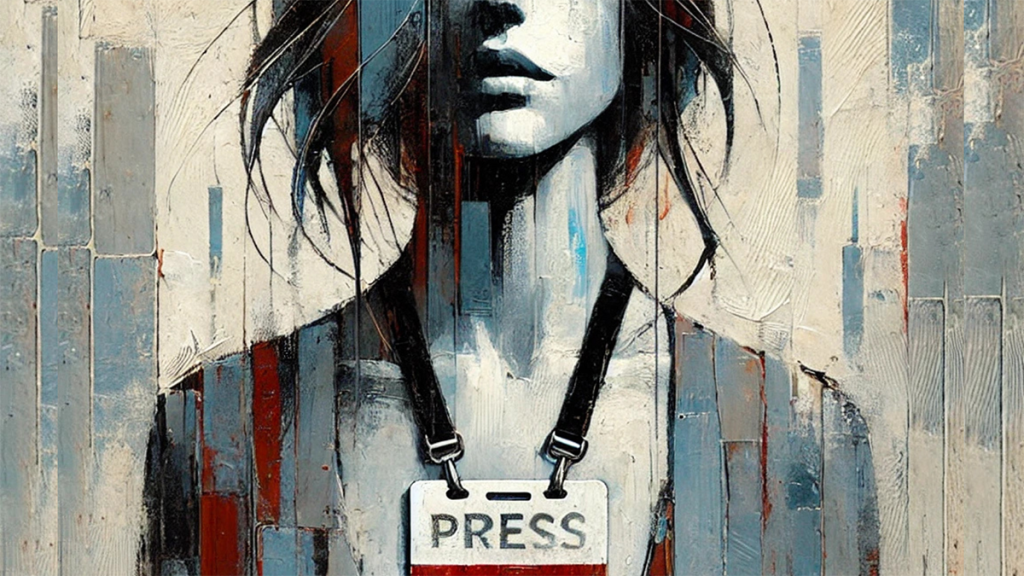
DALL-E generated image by Claudia Yaujar-Amaro
When a press pass should shield us
Immigration coverage must be more in-depth, and we need more reporters to ensure that
When I first walked into my high school newspaper, I wasn’t expecting much, just a chance to sit in on something I loved. But the teacher looked at me and told me to “speak better English” first. It was not the first time that my accent had caused problems, and it would not be the last.
I graduated with good grades, full of promise that college was the steppingstone to becoming a journalist. But at each turn, I came up short, my immigration status shut doors where my work ethic should have opened them.
Years later, after a string of no’s and countless times being talked down to or dismissed due to my Latina accent, I am finally doing the work I dreamed of. I am a journalist. I tell stories. I am serving my community. I am elevating voices that are often ignored.
But, as I live this hard-won dream, I find myself pausing and questioning: Is it safe to keep telling these stories?
Because today, being an immigrant journalist feels more vulnerable than ever.
When reporter Mario Guevara was detained by ICE while reporting on a protest in Georgia this summer, it shook something loose in all of us who work in this field. His detention sent a chilling message: You are not only at risk because of your status, you are at risk because of your profession.
Why I’m creating a tool for journalists
As a fellow with the Reynolds Journalism Institute, I’m developing a practical, accessible tool to help more journalists, especially those not yet comfortable with immigration coverage, navigate this beat with context, ethics and depth.
It will include guidance, sources, reporting templates, and real-world examples to support investigative, community-driven immigration journalism that goes beyond headlines and trauma.
If you are a reporter who would like to write about immigration more thoughtfully or who has ever asked himself or herself how to begin, I’d love to hear from you. This work will only be as powerful as the community that sustains it.
So, if you have been considering whether immigration is “your beat,” this is your invitation — it is. And we need you more than ever.
The issue isn’t a dearth of coverage, it’s a depth deficiency
I’ve asked dozens of colleagues to assist in covering the immigration stories about the policies that are harming individuals and the systems that are never challenged. And most often, the reply is silence.
Most local newsrooms covering immigration only report the extreme deportations, raids, separation of families. The reporting is typically trauma and crisis-oriented, not structure and systems-oriented. We never get to actually see cause investigations, or reporting which poses tough questions such as: Who benefits from detention? Who benefits from having the system broken? What drove the migration of certain groups?
The outcome is a narrative imbalance. Anti-immigrant messages are always magnified in echo chambers, while pro-immigrant messages are drowned out, a 2022 Cornell University study concluded.
Journalism can do better
When immigration is misrepresented — or beyond that, ignored — entire communities suffer. Misinformation spreads. Panic is manufactured. Antidemocratic policies become normalized. And the true stories, the ones about housing inequality, municipal regulations, worker’s rights, and systemic obstacles are never heard.
This isn’t about adding more stories. This is about all journalists bringing their skill to the job of seeing further and deeper. You don’t have to be an immigrant to report on immigration. But you must be curious. Dedicated. Fearless.
Because if we don’t tell the full story, someone will; and too often it is told with an agenda that causes harm.
Next steps
- I will develop a brief survey for my fellow journalists to fill out. I would love for local journalists (immigrant and nonimmigrant), newsroom editors, student reporters, bilingual/multilingual freelancers to support me by filling it out.
- I will start designing the framework for the tool to be developed. I welcome any comments or ideas from other journalists.
Cite this article
Yaujar-Amaro, Claudia (2025, July 30). When a press pass should shield us. Reynolds Journalism Institute. Retrieved from: https://rjionline.org/news/when-a-press-pass-should-shield-us/
